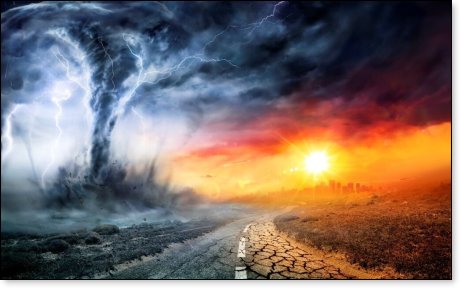
Rev. Mark H. Creech

The National Association of Evangelicals (NAE) just released a report on global climate change, arguing environmental activism has the support of the Scriptures and Christians should get engaged in helping remedy the earth’s potential peril. But according to the Washington Post, the authors admit that convincing evangelicals won’t be easy, “considering the religious group has historically been one of the demographics most resistant to action on the issue.”
“In a Pew Research survey conducted in January, White evangelicals were the group least likely to agree that human activity contributes to climate change, with only 54 percent saying humanity contributed a great deal or some to the trend. By comparison, 72 percent of White non-evangelicals, 73 percent of White Catholics, 81 percent of Black Protestants, and 86 percent of Hispanic Catholics” acknowledge the issue as a global crisis, reports the Post.
It’s disappointing that the NAE is on board with global warming alarmists for several reasons. In his book Politics: According to the Bible, Wayne Grudem provides some excellent biblical arguments for not investing confidence in the global warming narrative. He writes:
- God didn’t design a fragile earth, but a resilient one. “[S]hould Christians believe that God has actually designed the earth to be this fragile in response to human activity? This would be analogous to believing that an architect designed a building so that if someone leaned against one wall, its structural feedback would so magnify the stress of that person’s weight that the building would collapse! No one would consider such an architectural design ‘very good.’ Yet Genesis 1:31 tells us, ‘God saw everything that he had made, and behold, it was very good.’"
- God has promised to maintain the earth’s stability. “God promised, ‘While the earth remains, seedtime and harvest, cold and heat, summer and winter, day and night, shall not cease’ (Gen. 8:22).”
- It is displeasing to God when we fail to acknowledge his control of the weather. In Jeremiah 5, the Lord rebuked Israel, saying:
- God did not design the earth so that we would destroy it from obeying his commands. God told humanity to “fill the earth and subdue it” in Genesis 1:28. “Do we think that God set up the earth so that we would destroy it by obeying these commands to develop the earth’s resources and use them for our benefit?… Did he set up the earth so that when we burn wood to warm ourselves or cook food, or when we burn gasoline to drive to work or school or church, or when we use diesel fuel to transport food and clothing and household goods from farm or factory to market, or when we burn oil or coal or natural gas to produce electricity to cook with or to heat or cool our homes or to provide light – do we really think God set up the earth to work in such a way that the more we do these morally right things, the more we will destroy the earth?”
“But this people has a stubborn and rebellious heart; they have turned aside and gone away. They do not say in their hearts, ‘Let us fear the Lord our God, who gives the rain in its season, the autumn rain and the spring rain, and keeps for us the weeks appointed for harvest.’ Your iniquities have turned these away [that is, the rains and the harvest seasons], and your sins have kept good from you" (Jer. 5:23-25).

Grudem charges that global warming alarmists want to burden us with false guilt and take away from us “the best, most convenient, and cheapest energy sources we have.” God didn’t create the world to break down and be destroyed because we engaged in “morally right human activities,” which were “done in obedience to him.” Again, development of the earth’s resources is part of what it means to obey God’s command to “fill the earth and subdue it.”
Despite what’s said to the contrary, the scientific community is divided over global warming. The Nongovernmental International Panel on Climate Change (NIPCC), an international panel of nongovernment scientists and scholars who have consolidated their efforts to understand the causes of climate change, argue that nature, not human activity, controls the climate. They strongly advocate that human greenhouse emissions do not cause climate change. And, because they don’t work for any governments, they don’t suffer from any bias that assumes more government activity is needed to address climate change.
If indeed it could be proven there is a global pattern of more frequent, more severe, and more intense weather than previously known (and the NIPCC says the data doesn’t show it) this wouldn’t necessarily prove that increases in carbon dioxide are causing it.

A more likely explanation for such weather phenomena is something most people would never consider. The Scriptures make it abundantly clear that God uses natural disasters – floods, fires, severe storms, hail, earthquakes, drought – as a means of warnings and judgments. When Adam and Eve rebelled against God in the Garden of Eden, they upset the entire ecology of the planet. The punishment of the worldwide flood in Noah’s day and the terrible hail which fell upon Egypt in Moses’ day are examples of when God changed the climate as judgment for sin. The account in the book of Jonah says the severe storm he encountered at sea was because he was running from God.
God can use the weather to bless or punish. Job 37:13 reads:
“He loads the clouds with moisture, and they flash with his lightning. The clouds churn about at his direction. They do whatever he commands throughout the earth. He makes these things happen either to punish people or to show his unfailing love.”

Of course, not all natural disasters are a judgment from God, but just part of living in a fallen world. Nevertheless, when nations grow more wicked and ignore God’s sovereignty and increasingly defy his moral order, God has been known to send warnings and punishments through harsh weather changes. These events remind us who is in control and to whom we are accountable. They often tell us of the need for corporate repentance and reconciliation with our Maker.
Is the attention being given to so-called global warming distracting us from the real issue today – God’s warnings to repent of our sins?
Stephen Moore, a senior fellow at Freedom Works, seems to capture what today’s modern environmentalism is. In a recent column, Moore says it’s like the adherents to a pagan religion, “who worship the created, not the Creator.” He writes:
"It’s about ruining the economy as a sacrifice to Mother Earth. Marc Morano, the journalist who runs ClimateDepot.com, asks: ‘Will human sacrifices be next to appease the “angry” Earth gods?’ He adds that support for climate change ‘will create human sacrifice by imposing even more suffering from energy deprivation, supply chain issues,... shortages, inflation, debt, and bad science…. The suffering that will occur from this assault on American energy security and reliability could be profound – and it will be the lowest income people who will be hurt the most. Inflation will rise as energy prices soar. The shortages of energy will cause hardship for many consumers, including food shortages…It’s one of those sacrifices to Mother Earth.'”
Such is the price of turning to idolatry rather than God.
Eliminating or limiting the consumption of fossil fuels won’t do anything to change the climate! But the heat of God’s wrath, the lightning, the tumultuous winds, the floods, the tornadoes, the earthquakes, the fires, the droughts, the famines, and pestilences may possibly multiply unless we return to the Lord of the nations.
Of course, many will deem this estimate of global warming as unacademic, unscientific, and even unChristian. But it is the height of foolishness to embrace a view of nature which conflicts with the Bible and proposes solutions that will have a disastrous effect on the economy, the poor, and even liberty because of the growth of government control.
No matter how well-intended, it is unbecoming for the NAE to urge evangelicals to unite with modern environmentalism’s pagan religion. The urgent need of the hour is for evangelicals to focus on preaching repentance from sin and faith in Jesus Christ.
© Rev. Mark H. CreechThe views expressed by RenewAmerica columnists are their own and do not necessarily reflect the position of RenewAmerica or its affiliates.




















